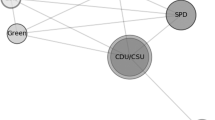Abstract
This article anlayses the change in the balance of power in the European Union Council due to the United Kingdom leaving (referred to as Brexit). This analysis is based on the concept of power indices in voting games where natural coalitions, called pre-coalitions, occur between various players (or parties). The pre-coalitions in these games are assumed to be formed around the six largest member states (after Brexit, the five largest), where each of the remaining member states joins the pre-coalition based around the large member state which is the most similar according to the subject of the vote. This is illustrated by an example. We consider adaptations of three classical indices: the Shapley-Shubik, Banzhaf-Penrose and Johnston indices based on the concept of a consistent share function (also called quotient index). This approach can be interpreted as a two-level process of distributing power. At the upper level, power is distributed amongst pre-coalitions. At the lower level, power is distributed amongst the members of each pre-coalition. One of the conclusions of the research is that removing the UK from the voting game means that the power indices of small countries actually decrease. This seems somewhat surprising as the voting procedure in the EU council was designed to be robust to changes in the number and size of member states. This conclusion does not correspond to a general result, but does indicate the difficulty of defining voting rules which are robust to changes in the set of players.
Access this chapter
Tax calculation will be finalised at checkout
Purchases are for personal use only
Similar content being viewed by others
References
Alonso-Meijide, J., Bowles, C., Holler, M., Napel, S.: Monotonicity of power in games with a priori unions. Theory Decis. 66, 17–37 (2009)
Alonso-Meijide, J.M., Fiestras-Janeiro, M.G.: Modification of the Banzhaf value for games with a coalition structure. Ann. Oper. Res. 109, 213–227 (2002)
Banzhaf, J.F.: Weighted voting doesn’t work: a mathematical analysis. Rutgers Law Rev. 19, 317–43 (1965)
Bertini, C., Freixas, J., Gambarelli, G., Stach, I.: Some open problems in simple games. Int. Game Theory Rev. 15(02), 1340005 (2013)
Bertini, C., Gambarelli, G., Stach, I.: Apportionment strategies for the European parliament. In: Gambarelli, G., Holler, M.J. (eds.), Power Measures III. Homo Oeconomicus, vol. 22, pp. 589–604 (2005)
Gambarelli, G., Stach, I.: Power indices in politics: some results and open problems. Homo Oeconomicus 26, 417–441 (2009)
Gambarelli, G., Stach, I.: Sub-coalitional approaches to values. In this edition (2017)
http://ec.europa.eu/eurostat/data/database. Accessed 21 Dec 2016
Johnston, R.J.: On the measurement of power: some reactions to Laver. Environ. Plann. A 10, 907–914 (1978)
Kauppi, H., Widgrén, M.: Voting rules and budget allocation in an enlarged EU. Eur. J. Polit. Econ. 23, 693–706 (2007)
Kóczy, L.Á.: Beyond Lisbon: demographic trends and voting power in the European Union Council of ministers. Math. Soc. Sci. 63(2), 152–158 (2012)
Leech, D.: Computing power indices for large voting games. Manage. Sci. 49, 831–837 (2003)
Malawski, M.: “Counting” power indices for games with a priori unions. Theory Decis. 56(1–2), 125–140 (2004)
Mercik, J.W., Turnovec, F., Mazurkiewicz, M.: Does voting over national dimension provide more national influence in the European parliament than voting over ideological dimension? In: Owsiński, J.W. (ed.), Integration, Trade, Innovation and Finance: From Continental to Local Perspectives. Polish Operational and Systems Research Society, Warsaw, pp. 173–186 (2004)
Myerson, R.: Graphs and cooperation in games. Math. Oper. Res. 2(3), 225–229 (1977)
Owen, G.: Values of games with a priori unions. In: Lecture Notes in Economic and Mathematical Systems, vol. 141, pp. 76–88 (1977)
Owen, G.: Modification of the Banzhaf-Coleman index for games with a priori unions. In: Holler, M.J. (ed.) Power, Voting, and Voting Power, pp. 232–238. Physica-Verlag, Würzburg (1982)
Owen, G.: Values of graph-restricted games. SIAM J. Algebraic Discrete Meth. 7(2), 210–220 (1986)
Penrose, L.S.: The elementary statistics of majority voting. J. R. Stat. Soc. 109, 53–57 (1946)
Rohác̆, D.: The unanimity rule and religious fractionalisation in the Polish-Lithuanian Republic. Const. Polit. Econ. 19(2), 111–128 (2008)
Shapley, L.S., Shubik, M.: A method for evaluating the distributions of power in a committee system. Am. Polit. Sci. Rev. 48, 787–92 (1954)
Turnovec, F.: Fairness and squareness: fair decision making rules in the EU council. Oper. Res. Decis. 4, 109–124 (2009)
Van den Brink, R., Van der Laan, G.: A class of consistent share functions for games in coalition structure. Tinbergen Institute Discussion Paper No. 01–044/1 (2001)
www.warwick.ac.uk/~ecaae. Accessed 22 Dec 2016
Author information
Authors and Affiliations
Corresponding author
Editor information
Editors and Affiliations
Rights and permissions
Copyright information
© 2017 Springer International Publishing AG
About this chapter
Cite this chapter
Mercik, J., Ramsey, D.M. (2017). The Effect of Brexit on the Balance of Power in the European Union Council: An Approach Based on Pre-coalitions. In: Mercik, J. (eds) Transactions on Computational Collective Intelligence XXVII. Lecture Notes in Computer Science(), vol 10480. Springer, Cham. https://doi.org/10.1007/978-3-319-70647-4_7
Download citation
DOI: https://doi.org/10.1007/978-3-319-70647-4_7
Published:
Publisher Name: Springer, Cham
Print ISBN: 978-3-319-70646-7
Online ISBN: 978-3-319-70647-4
eBook Packages: Computer ScienceComputer Science (R0)




